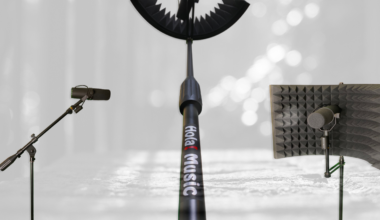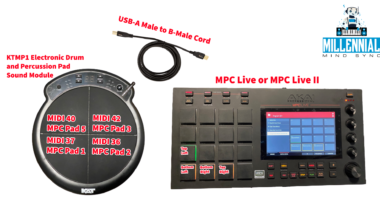
Was this your first profitable year from selling beats online? You may then be wondering how to file taxes for selling beats. Or, maybe if you should even be paying taxes on the income you generated as a music producer? The short answer to this is, Yes, and I’ll explain why throughout this article.
Is producing and selling beats your business or a hobby?
If you’re generating income for the beats you sell, that money is taxable. It doesn’t matter if this is a hobby business or a professional business.
For those who are self-employed, like beatmakers, audits are rare, but that doesn’t mean you should avoid paying taxes on your beat income.
If you’re a hobbyist and don’t have any aspirations of anything greater, chances are your income is minimal, and there won’t be a need for you to have a legal entity established and can file this income as an individual along with any other income you’ve earned throughout the year.
But for those with scaled beat selling businesses or generating large income from sync licenses, you should look into forming a LLC or some other legal entity, so you can keep your income and deductions separate.
How much tax can I anticipate paying from my beat sales?
Whether you’re selling beats as a hobbyist or a professional, planning and forecasting the amount of tax owed is a good idea.
What you will be taxed can vary by your Country or State’s local tax laws, so I will speak in general terms. I highly recommend you subscribe to a service like TaxAct, which can guide you through all of this in their Self Employed tier.
A great rule is to set aside 25% of everything you earn for taxes. The actual amount you owe could be less, but this will give you a good buffer incase anything unforeseen happens.
So, for every $100 you sell in beats, put $25 aside for taxes. Every $1,000, put aside $250. This is a good practice, so you don’t owe anything unexpected when you go to file your taxes at the end of each calendar year.
Again, for a more accurate way to forecast this, TaxAct has a great Self Employment tax guidance resources.
Can the amount of tax I pay from selling beats be lowered?
Just like any business, as a music producer or beatmaker you will have operating expenses. And the majority of these expenses will qualify as deductions from your taxable income.
Since what you will ultimately be taxed on is your net income, the expenses that you accrue throughout the year as someone who sells beats online can help drive that taxable amount down.
In this guide to taxes for beatmakers and music producers, let’s take a look at some of those tax deductions.
What are the top tax deductions for selling beats?
If you sell beats online, you likely have several nominal expenses to support your business throughout the year. And these expenses can be deductions to the tax you will owe. These are the top tax deductions for selling beats.
The cost to register for a business license
If you’ve decided to make selling beats your career, registering for a business license could be something you invested in. Depending on where you reside, there are different ways and costs associated with doing this. These business license expenses are tax deductible.
Your recording studio or workspace
One thing that’s important to note in this guide to taxes for beatmakers is that your office space is tax deductible. Now your office could be a recording studio you’re renting, it could be your bedroom, it could be a space in your apartment you’ve setup a desk and some of your music production equipment. If you’re working out of your own home or apartment for instance, the percentage of space that your workspace occupies in relation to your entire home would qualify for a deduction.
Utility costs for your recording studio or workspace
As someone who makes and sells beats online you will need to pay utility costs for your workspace. If you’re renting a separate space for your studio, the utility costs for that studio are tax deductible. If you’re producing music out of your bedroom, you can deduct the percentage of utility costs based upon the percentage of space your studio occupies in your home.
Fees associated with your online beat store
If you’re selling beats online, there is no doubt you’re paying for your own domain and web hosting through a service like Bluehost. You’re also likely paying for a premium marketplace like Airbit to sell your beats. Maybe you’re selling sample and loop packs through Sellfy. You could also be distributing your beats to DistroKid be streamed on sites like Apple Music or Spotify. All these fees and subscriptions to maintain your presence online for selling beats are tax deductible.
Marketing and advertising expenses to promote your beats
As a music producer looking into how to file taxes for selling beats, you might not be thinking about your expenses relative to the marketing of your beats as a tax deduction. These expenses could be Facebook Ads, or a Marketing Automation platform like Sendinblue. If you’re designing the artwork for your beats, you may have a Canva Pro subscription or another brand building tool. All of these fees associated with marketing your beats are tax deductible.
Music Production software expenses
Did you invest in a new Digital Audio Workstation (DAW) like FL Studio throughout the year? Or maybe you purchased some new VST plugins from Plugin Boutique. Do you have a subscription to Splice or Loopcloud? All these software expenses relative to the making of your beats are tax deductible.
Music Production equipment expenses
As a beatmaker, the music technology landscape is always changing and evolving which means there is new gear that you could’ve purchased. Don’t forget to add up all these expenses related to music production gear that you purchased as you can also deduct them from your taxes.
Travel & Lodging expenses
Did you drive to a gig or studio session? Maybe you flew to a music production conference or other business related activity. The expenses from these trips (meals included) related to your business are tax deductible.
Membership fees for music professional associations
Do you belong to any professional associations? These associations relative to music production and beat making are tax deductible.
Fees for professional services (e.g. Legal, Tax related expenses)
If you’re reading this article, you’re likely searching for how to file taxes for selling beats. You may even have some questions related to filing your taxes for beat sales that aren’t answered here. Tax Act has some excellent free resources and guides for music producers. Don’t worry the expenses for any legal or tax professional you hire are deductible.
Research and educational expenses for selling beats and sync licensing
If you read my book, you already know how lucrative sync licensing is. But did you know that this could also qualify you for some research expenses that are tax deductible. Let’s say you want to research a Netflix or Apple TV+ show to hopefully get your music placed on. You need that subscription to research the music supervisor and the types of music they are using in context with the show. Don’t worry that Apple TV+ subscription is deductible. Or, maybe you purchased a new DAW and you want to take some digital courses on them. Any education expenses you accrue during the year are also tax deductible.
Learning how to file taxes for selling beats
To recap, you absolutely should be paying tax for the beats you sell. And using the top tax deductions for selling beats will help you save. Hiring a tax professional or using an amazing service like Tax Act will help you get this done correctly.





